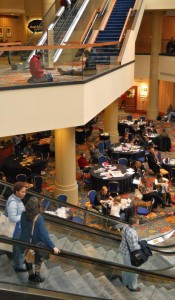
AWP photo by Josie Keenan
But when I asked the young man what sort of writing he was working on, he gave me statistics about his social networking instead–how many followers he had on Facebook, his blog, Twitter, etc. Then he quipped, “I’ve already got a great audience, I just need to write something to publish.” He was only half joking.
I was reminded of this incident while reading the Times this morning. In her wonderful article “In a Data-Heavy Society, Being Defined by the Numbers,” Alina Tugend meditates on her own obsession with “followers” and “fans,” as well as how metric-sensitive we’ve become as a society. She even admits to signing her sons up for Twitter–neither of whom uses it–simply to give her numbers a boost.
This is particularly true for writers, it seems, because our work is so often measured by stars or “likes” or retweets. In the article, the author quotes Robin Black, author of the collection If I Loved You, I Would Tell You This, who recently blogged about the ways in which a writer can become so wrapped up in the various ways of measuring a book’s success that she loses focus on the work itself. Black says to Tugend, “Twenty years ago, maybe every Sunday you looked at the New York Times best-seller list…Now you can torture yourself 24 hours a day, seven days a week. It becomes an exercise in scab picking.”
But what if the obsession with numbers becomes so pronounced that it not only distracts us from returning to our work, but prevents us from doing any writing in the first place?



